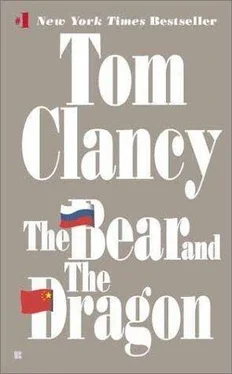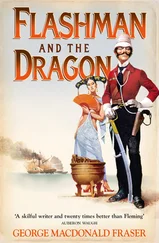Tom Clancy - The Bear and the Dragon
Здесь есть возможность читать онлайн «Tom Clancy - The Bear and the Dragon» весь текст электронной книги совершенно бесплатно (целиком полную версию без сокращений). В некоторых случаях можно слушать аудио, скачать через торрент в формате fb2 и присутствует краткое содержание. Год выпуска: 2001, ISBN: 2001, Жанр: Триллер, на английском языке. Описание произведения, (предисловие) а так же отзывы посетителей доступны на портале библиотеки ЛибКат.
- Название:The Bear and the Dragon
- Автор:
- Жанр:
- Год:2001
- ISBN:780425180969
- Рейтинг книги:3 / 5. Голосов: 1
-
Избранное:Добавить в избранное
- Отзывы:
-
Ваша оценка:
- 60
- 1
- 2
- 3
- 4
- 5
The Bear and the Dragon: краткое содержание, описание и аннотация
Предлагаем к чтению аннотацию, описание, краткое содержание или предисловие (зависит от того, что написал сам автор книги «The Bear and the Dragon»). Если вы не нашли необходимую информацию о книге — напишите в комментариях, мы постараемся отыскать её.
The Bear and the Dragon — читать онлайн бесплатно полную книгу (весь текст) целиком
Ниже представлен текст книги, разбитый по страницам. Система сохранения места последней прочитанной страницы, позволяет с удобством читать онлайн бесплатно книгу «The Bear and the Dragon», без необходимости каждый раз заново искать на чём Вы остановились. Поставьте закладку, и сможете в любой момент перейти на страницу, на которой закончили чтение.
Интервал:
Закладка:
“Why did they run so soon?” Peng asked. “Do we know?”
“We found a written order in one of the bunkers, authorizing them to leave when they thought things were untenable. That surprised me,” Colonel Wa observed. “Historically, the Russians fight very hard on the defense, as the Germans found. But that was under Stalin. The Russians had discipline then. And courage. Not today, it would seem.”
“Their evacuation was conducted with some skill,” Peng thought out loud. “We ought to have taken more prisoners.”
“They ran too fast, Comrade General,” operations explained.
“He who fights and runs away,” General Peng quoted, “lives to fight another day. Bear that in mind, Colonel.”
“Yes, Comrade General, but he who runs away is not an immediate threat”
“Let’s go,” the general said, heading off to his command track. He wanted to see the front, such as it was.
So?” Bondarenko asked the lieutenant. The youngster had been through a bad day, and being required to stand and make a report to his theater commander made it no better. ”Stand easy, boy. You’re alive. It could have been worse.”
“General, we could have held if we’d been given a little support,” Komanov said, allowing his frustration to appear.
“There was none to give you. Go on.” The general pointed at the map on the wall.
“They crossed here, and came through this saddle, and over this ridge to attack us. Leg infantry, no vehicles that we ever saw. They had man-portable anti-tank weapons, nothing special or unexpected, but they had massive artillery support. There must have been an entire battery concentrated just on my one position. Heavy guns, fifteen-centimeter or more. And artillery rockets that wiped out our artillery support almost immediately.”
“That’s the one surprise they threw at us,” Aliyev confirmed. “They must have a lot more of those fire-finder systems than we expected, and they’re using their Type 83 rockets as dedicated counter-battery weapons, like the Americans did in Saudi. It’s an effective tactic. We’ll have to go after their counter-battery systems first of all, or use self-propelled guns to fire and move after only two or three shots. There’s no way to spoof them that I know of, and jamming radars of that type is extremely difficult.”
“So, we have to work on a way to kill them early on,” Bondarenko said. “We have electronic-intelligence units. Let them seek out those Chink radars and eliminate them with rockets of our own.” He turned. “Go, on. Lieutenant. Tell me about the Chinese infantry.”
“They are not cowards, Comrade General. They take fire and act properly under it. They are well-drilled. My position and the one next to us took down at least two hundred, and they kept coming. Their battle drill is quite good, like a soccer team. If you do this, they do that, almost instantly. For certain, they call in artillery fire with great skill.”
“They had the batteries already lined up, Lieutenant, lined up and waiting,” Aliyev told the junior officer. “It helps if you are following a prepared script. Anything else?”
“We never saw a tank. They had us taken out before they finished their bridges. Their infantry looked well-prepared, well-trained, even eager to move forward. I did not see evidence of flexible thinking, but I did not see much of anything, and as you say, their part of the operation was preplanned, and thoroughly rehearsed.”
“Typically, the Chinese tell their men a good deal about their planned operations beforehand. They don’t believe in secrecy the way we do,” Aliyev said. “Perhaps it makes for comradely solidarity on the battlefield.”
“But things are going their way, Andrey. The measure of an army is how it reacts when things go badly. We haven’t seen that yet, however.” And would they ever? Bondarenko wondered. He shook his head. He had to banish that sort of thinking from his mind. If he had no confidence, how could his men have it? “What about your men, Valeriy Mikhailovich? How did they fight?”
“We fought, Comrade General,” Komanov assured the senior officer. “We killed two hundred, and we would have killed many more with a little artillery support.”
“Will your men fight some more?” Aliyev asked.
“Fuck, yes!” Komanov snarled back. “Those little bastards are invading our country. Give us the right weapons, and we’ll fucking kill them all!”
“Did you graduate tank school?”
Komanov bobbed his head like a cadet. “Yes, Comrade General, eighth in my class.”
“Give him a company with BOYAR,” the general told his ops officer. “They’re short of officers.”
Major General Marion Diggs was in the third train out of Berlin; it wasn’t his choosing, just the way things worked out. He was thirty minutes behind Angelo Giusti’s cavalry squadron. The Russians were running their trains as closely together as safety allowed, and probably even shading that somewhat. What was working was that the Russian national train system was fully electrified, which meant that the engines accelerated well out of stations and out of the slow orders caused by track problems, which were numerous.
Diggs had grown up in Chicago. His father had been a Pullman porter with the Atcheson, Topeka, and Santa Fe Railroad, working the Super Chief between Chicago and Los Angeles until the passenger service had died in the early 1970s; then, remarkably enough, he’d changed unions to become an engineer. Marion remembered riding with him as a boy, and loving the feel of such a massive piece of equipment under his hands-and so, when he’d gone to West Point, he’d decided to be a tanker, and better yet, a cavalryman. Now he owned a lot of heavy equipment.
It was his first time in Russia, a place he certainly hadn’t expected to see when he’d been in the first half of his uniformed career, when the Russians he’d worried about seeing had been mainly from First Guards Tank and Third Shock armies, those massive formations that had once sat in East Germany, always poised to take a nice little drive to Paris, or so NATO had feared.
But no more, now that Russia was part of NATO, an idea that was like something from a bad science-fiction movie. There was no denying it, however. Looking out the windows of the train car, he could see the onion-topped spires of Russian Orthodox churches, ones that Stalin had evidently failed to tear down. The railyards were pretty familiar. Never the most artistic examples of architecture or city planning, they looked the same as the dreary yards leading into Chicago or any other American city. No, only the train yards that you built under your Christmas tree every year were pretty. But they didn’t have any Christmas trees in evidence here. The train rolled to a stop, probably waiting for a signal to proceed-
— but no, this looked to be some sort of military terminal. Russian tanks were in evidence off to the right, and a lot of sloped concrete ramps-the Russians had probably built this place to ship their own tracked vehicles west, he judged.
“General?” a voice called.
“Yo!”
“Somebody here to see you, sir,” the same voice announced.
Diggs stood and walked back to the sound. It was one of his junior staff officers, a new one fresh from Leavenworth, and behind him was a Russian general officer.
“You are Diggs?” the Russian asked in fair English.
“That’s right.”
“Come with me please.” The Russian walked out onto the platform. The air was fresh, but they were under low, gray clouds this morning.
“You going to tell me how things are going out east?” Diggs asked.
“We wish to fly you and some of your staff to Chabarsovil so that you can see for yourself.”
Читать дальшеИнтервал:
Закладка:
Похожие книги на «The Bear and the Dragon»
Представляем Вашему вниманию похожие книги на «The Bear and the Dragon» списком для выбора. Мы отобрали схожую по названию и смыслу литературу в надежде предоставить читателям больше вариантов отыскать новые, интересные, ещё непрочитанные произведения.
Обсуждение, отзывы о книге «The Bear and the Dragon» и просто собственные мнения читателей. Оставьте ваши комментарии, напишите, что Вы думаете о произведении, его смысле или главных героях. Укажите что конкретно понравилось, а что нет, и почему Вы так считаете.






![Александр Ирвин - Tom Clancy’s The Division 2. Фальшивый рассвет [litres]](/books/417744/aleksandr-irvin-tom-clancy-s-the-division-2-falsh-thumb.webp)




